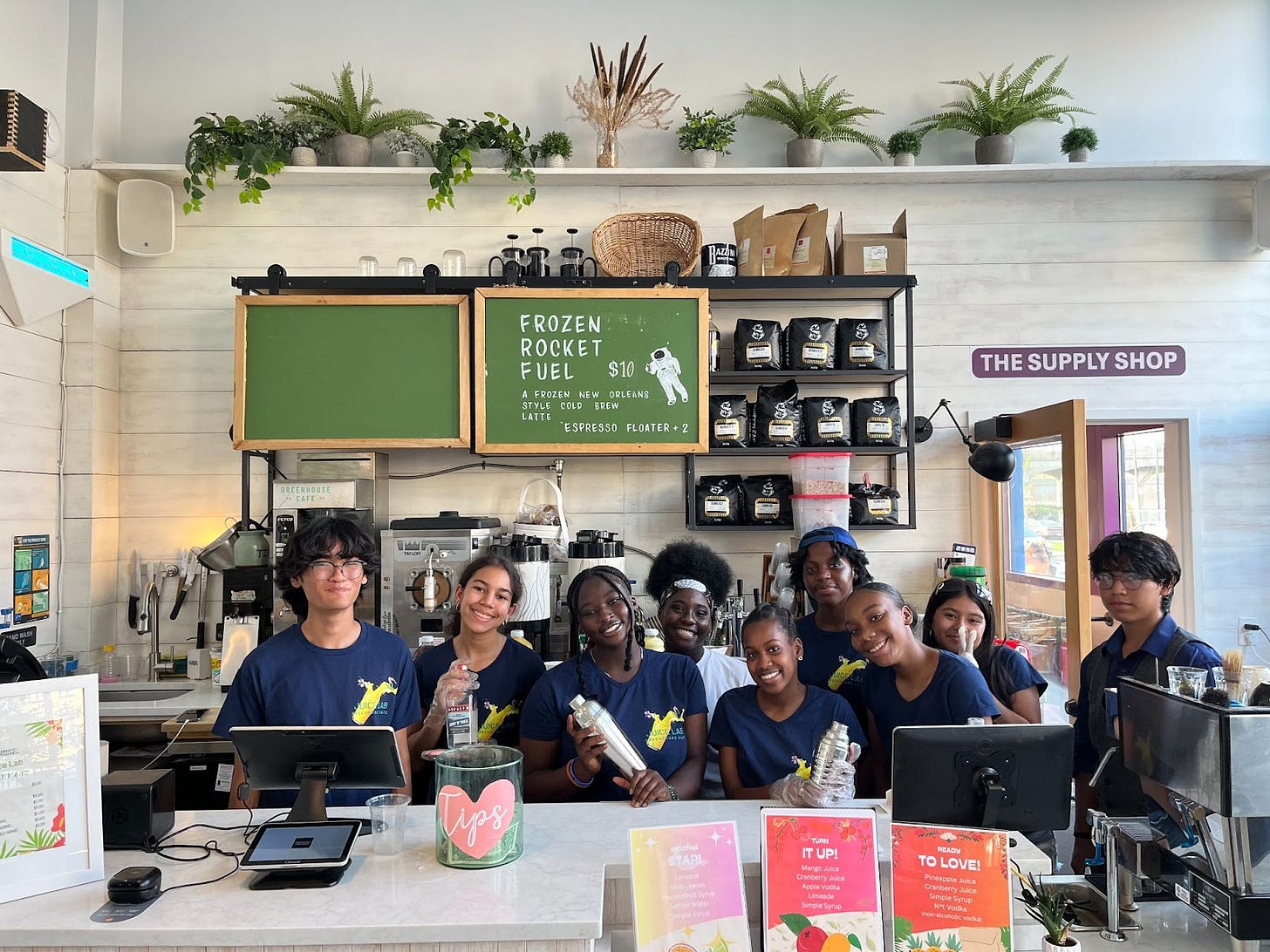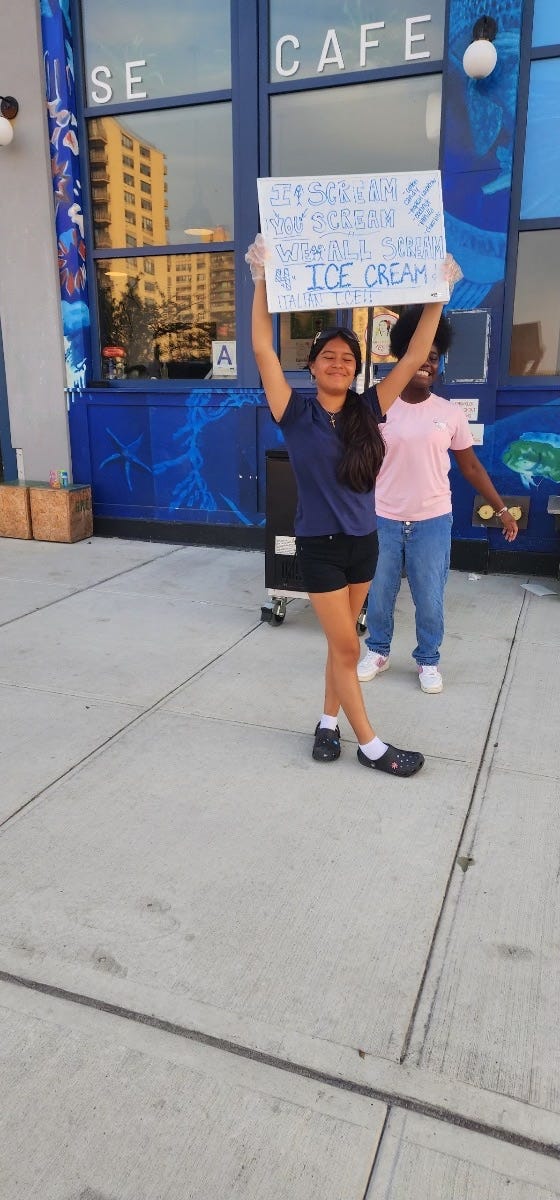This Rockaway Juice Lab Empowers High School Students
Check it out tonight at the Greenhouse Cafe!
Hi everyone,
It’s been a glorious week hasn’t it? The outdoor furnace of the last weeks seems to have been turned off, and summer feels like a long lost friend who’s finally found their way home, bringing sweet breezes and cool nights. I’m in heaven out here on The North Fork enjoying my favorite things: Laying around and reading (The Covenant of Water at the moment which is fantastic), playing games with the kids, doing nothing by the pool, shopping at Old Time Vintage, eating oysters everywhere we can, snacking on fried chicken at Jennie's at Drossos, going around and around on the carousel, having tacos and margs at Lucharitos, and many bottles of wine from Lieb, Paumanok, Peconic Bay, and more.
I’m taking the week off from writing, but wanted to share this one event happening tonight because it is just so fantastic – it’s all called the Juice Lab, and it’s all about fresh mocktails, a group of amazing high school students, and building a sustainable, successful future for youth.
You can visit the Juice Lab tonight at the Greenhouse Cafe out at the Rockaway Hotel and sample delicious summer mocktails made by local high school students! On the menu you’ll find drinks like The Strawberry Moon: Limeade, Mint Leaves, Passionfruit Syrup, Seltzer Water and Simple Syrup), Ready To Love: Pineapple Juice, Cranberry Juice, Simple Syrup and Not V*dka (non-alcoholic vodka; Turn It Up: Mango Juice, Cranberry Juice, Limeade, Simple Syrup and Apple Vodka (non-alcoholic; and Purple Rain: Lavender Syrup and Lemonade).
The kids are also hosting a dance contest tonight at 7:30 - first, second and third prizes $100, $50 and $25 Visa cards. The kids love to jam outside the cafe on the sidewalk in front of the mural.
I hope you can make it! Read on for more.
The story of The Juice Lab starts with Janice Zaballero, a Brooklyn mom who for 15 years was the Executive Director of the Breast Treatment Task Force, a Scan Van that visited low income women across New York City to provide access to breast health care. Many of the women treated are not able to seek breast health care otherwise. There was a lot of gratitude in that van, especially from women whose lives were changed by early detection and whose bank accounts were saved from medical bankruptcy. One of the nieces of a Scan Van patient was so grateful for the care her aunt received, she asked Janice if she could volunteer at the Scan Van.
Janice didn’t have an internship program, but she said sure, come on in we’ve got plenty to do. “This one teen started coming in to help out, and then she brought two friends along, and then before I knew it, I had a full program of high school volunteers,” Janice told me. After a couple of years, the High School seniors in the program were selecting sophomores for the internship program, training them to fill their shoes. The interns were running fundraising events, communications, intake, and day after day handled more and more. The seeds of an idea for a future workforce development program began to take hold.
When COVID shut down the Scan Van (the program continued with 30 medical partners but the van ceased operation), Janice went back to school at Harvard to study how to use education to drive change. What she came away with was a thought to create a formal program out of her Scan Van internship experiment, a working model for workforce development with high school students. “I wanted to develop programs that would actually help kids gain real life skills, and from seven years running that high school program what was clear is that this program was one way to do that.”
On June 9th, Janice launched The Juice Lab in partnership with The Scholar’s Academy, a high school across the street from the Rockaway Hotel in Queens. This is a neighborhood that’s thriving in many ways, with and surfers and summer tourists flocking on weekends, but that remains one of the poorest neighborhoods in Queens. It had a 2021 median household income of $54,790, about 24% less than citywide median household income ($72,150). The poverty rate in Rockaway/Broad Channel is also higher than the city average; it was 23.8% in 2021 compared to 18.0% citywide.
The Rockaway Hotel has already been creating programs to support the neighborhood (free swimming lessons, a workforce development program of its own), so it was a natural fit to became the Juice Lab partner, offering bar and restaurant training and support for the kids. Janice rented the hotel’s Greenhouse Cafe on Thursday evenings to host the weekly Juice Lab (tonight is the last one!)
For the pilot Juice Lab, a group of nine high school students from Scholar’s Academy were chosen (Tatyanna, 14; Natalie,15; Fisayo, 15; Victor, 15; Madison, 15; Zia, 16; Rachel, 15; Dario, 15; and Asabi, 15). The kids were tasked with creating and managing every part of the Juice Lab’s opening and operations: communications, advertising and outreach, budgeting, food costing, labor, scheduling, recipe development and testing, service and hospitality training, and more.
Mike Vallerio, director of F&B at the Rockaway Hotel, met with the kids to teach them how to budget, create cost sheets, and tricks like how to make the simple syrup themselves to cut costs. The hotel’s front of house manager, Alena Lopez, volunteered to support the kids and teach them hospitality and customer service, and intangibles like how to deal with stress and the constant fires that need to be put out in the restaurant business. The team flourished, learning real life business and hospitality skills, and digging into solving real world problems. They also made a little cash at every Juice Lab, a nice perk for summer fun.
The kids have come through two months of working together with a new set of skills. For Rachel, who designed the flyers, the Juice Lab gave her a newfound confidence. “I made the flyers and I liked handing them out and meeting people in the community. I have learned how to talk to people to talk to strangers and customers, learned to be more open,” she told me.
“I learned to budget and that wasn't something I have ever done before,” said Zia, who focused on comms and writing. “I learned how to store food so it stays fresher, and how ingredients work together,” said Victor, who led the recipe development team. “I loved coconut but what made it work for me was the lemon juice, it made it less sweet. I really liked it. And I taught myself how to make the drinks look nice, not just taste nice.”
“We all learned how to work under pressure,” said Asabi, who is 15. “There are times like last minute things come up and we have to keep going and can't give up. The event still needs to happen and we figure it out without stress.”
That “can do” attitude comes from Janice, who believes failure is an integral part of the learning process. “It is a personal philosophy of mind not to baby them,” Janice told me. “Even if things went wrong, I let them fail. They will learn from their mistakes, and then it will be fine. If you helicopter, they're not ever gonna get it.”
Janice believes the real life skills the kids learn are just as significant as the budgets, marketing, recipe development, and marketing and communications plans. “What do you do with that one team member that isn't pulling weight? How do you respond to stress? What happens if you get a mean email, how to handle customer service issues, how do you work through being overwhelmed, and figuring out how to work through this. This is real life training.”
Janice hopes to continue running the program throughout the year, but with funding so that the Juice Lab can become a paid internship and that she can cover the cost of her rent and goods needed to produce the drinks. (To learn more and support The Juice Lab, go here.)
She also hopes to replicate it across the country. “This concept has legs. How many coffee shops close early and are empty in the evening? We can create a handbook (yes, the kids are helping with that) to bring this training model across the country.”
The inaugural cohort of kids are not going anywhere; they are all staying on, excited for the next cohort of kids to start with the program so that they can train them. “It will be way easier to train the next group so we won't have to start from scratch. We are not going anywhere.”







